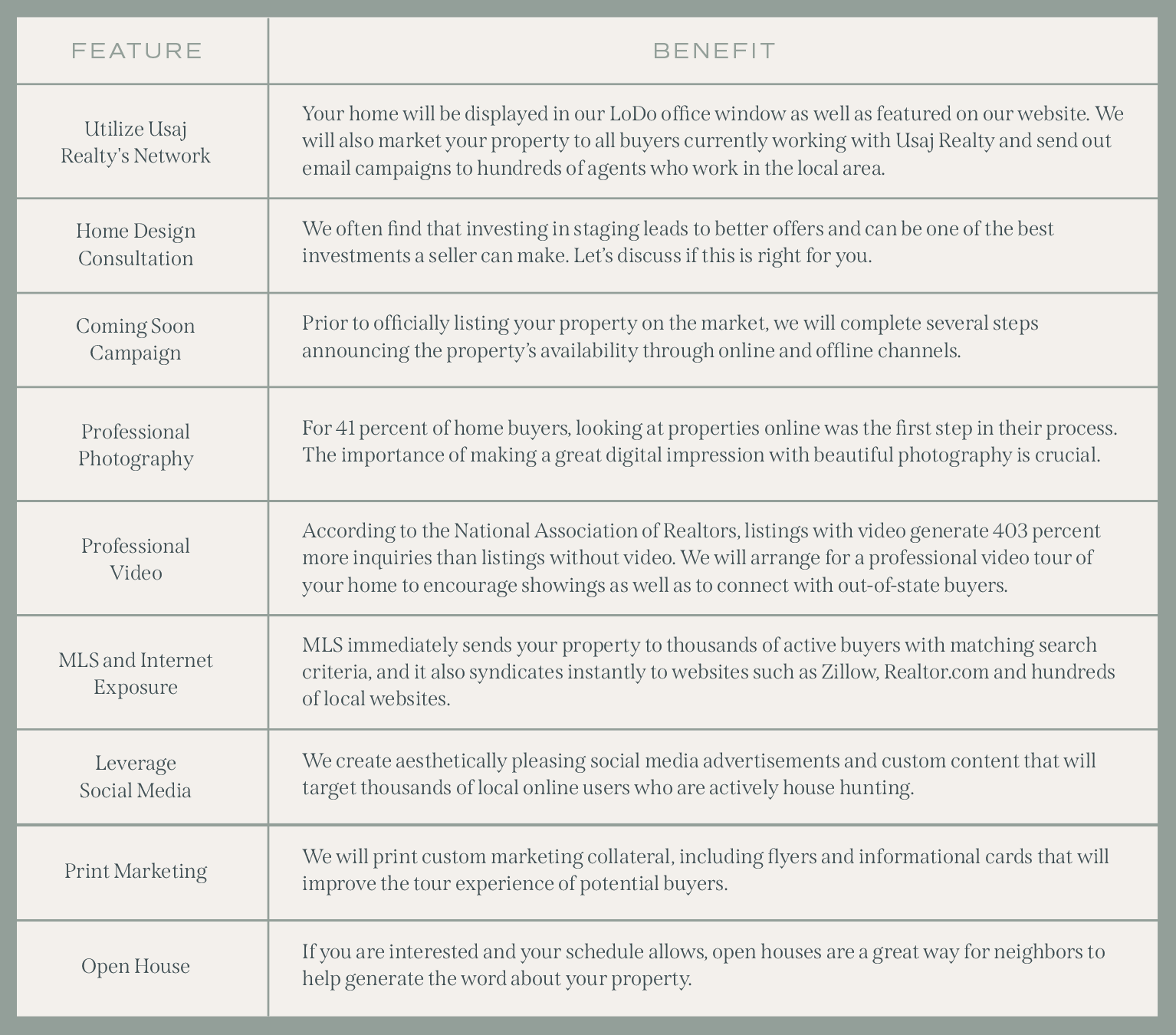For every homeowner, there comes a time when you’ll have to sell your home. For some, it won’t happen for decades; others will experience it after several years.
Whether you’ve outgrown the space, accepted a job transfer, got married (or divorced), or are downsizing, selling a home is a big event. The range of emotions can vary from bittersweet to elation, sad to ecstasy. But the bottom line is you want it to happen quickly while providing the most possible return on your investment.
Usaj Realty is committed to making the selling process as easy as possible. With our team of experts, a seamless move to the next chapter of your life is our goal.
The majority of people who have recently sold their homes have seen a healthy return on their investment. Although inventory has recently increased along with mortgage rates, the trend still favors home sellers assuming the home is priced appropriately. Rising rents are also encouraging people to consider buying a home.
While the thought of listing your home may produce a ton of anxiety, Usaj Realty brokers can efficiently guide you through the process. Expect them to exceed in the following areas:
- Enhancing your property so it sells for top dollar
- Attaining the highest net profit possible
- Achieving maximum exposure through top-notch marketing
- Expert negotiating on proposed contracts
- Thorough management of the transaction from start to finish
It’s important to note that having a knowledgeable real estate agent representing you is at the heart of a successful sale. And at the core of the sale, is understanding the responsibilities of your real estate agent. From the moment you make the decision to sell your home, it’s advisable to bring in an agent to formulate a plan to assure the selling process is seamless and assures you top dollar for your property.
According to the National Association of Realtors, up to 87 percent of buyers choose to work with a real estate agent to facilitate the real estate transaction and 90 percent of the home sellers were represented by an agent.
Since real estate agents work on a commission basis, it’s imperative to be clear on what the agent will be doing to market your home that will justify their involvement and ultimately, getting paid. A clear plan should be in place so the homeowner knows exactly what actions their real estate agent will be taking that will, hopefully, result in a quick offer and closing. No one wants a house to languish on the market, forcing price drops, unnecessary improvements, and worst of all, removing the listing entirely.
Before you select an agent, you may want to get a feel for their ability to haggle, knowledge of inclusions/exclusions related to your property, and how effective they are in closing a deal. The bottom line, your agent should be working for you and not the other way around.
Assuming you have already interviewed several agents and have decided upon one who you believe will best represent your interests, the agent should know your neighborhood. This is important for many reasons. It goes beyond just the property valuation and comparable sales within the last three to six months. The agent should know what features area homes have that potential buyers are seeking. Is a pool important? How about hardwood floors? Neighborhoods can have unique qualities and often the homes reflect those characteristics. A seasoned real estate agent will be able to quickly identify key selling points of your home and whether there are items you should consider adding before listing.
The bottom line is that the review of your property will ultimately determine the pricing. This is the step that causes the most anxiety. Is it too much? Is it too low? What is reasonable? The agent has many resources to help determine a price but don’t be afraid to question and ask for justification of the price.
Listed below are eight home seller tips when selling your home. Knowing ahead of time what’s in store will help guide you through the process and alleviate any missteps along the way.
How to Sell Your Home in Eight Steps
Step 1: Prepare your home

Before listing your property on the market, we will help ensure your home looks its best. Your broker will also arrange for professional home photos at no cost to you. A pre-inspection to determine what areas of your home need to be addressed is always a good idea.
When selling your home, your goal is to achieve the highest return on your investment — which means that smart home improvements and some property T-L-C can go a long way. We will help you formulate a plan to ensure your home looks its best. Your broker will arrange for high-quality listing photos and if needed, a home staging professional should assist with home showings. Investing in a pre-inspection will also help avoid any unanticipated issues that may crop up during closing.
Six ways to get your home prepped:
Declutter
Buyers love space, and the best way to make your home look as spacious as possible is to remove excess possessions. The excess should be anything you don’t absolutely need to function on a day-to-day basis while your home is on the market — perhaps half or more of your belongings unless you’re already a minimalist.
In addition to making your home more pleasing to potential buyers, decluttering will leave you with fewer objects to move and possibly some extra cash, should you have anything to sell. Donate, recycle, or toss anything that’s not worth your trouble to sell. Then put what’s left — the stuff you want to keep but can do without for a while — in a portable storage unit. It can be stored off-site and then easily moved to your new home without unpacking and repacking the contents like you’d have to do with a traditional storage unit. Decluttering also means you will have less packing to do after your home sells and it will be easier to do the other tasks required to get your home in move-out condition.
As part of the decluttering process, you should also depersonalize your home. Put away family photos, pet photos, kids’ artwork, and anything else that might make it hard for potential buyers to envision the home as theirs. While your personal travel photos or family portraits are great, they may distract buyers and make it difficult for them to picture themselves in their new home.
Repairs
Unless you’re selling your home as a fixer-upper (and you’re OK with discounting the price), you need to repair anything that needs fixing. A turnkey home will command the highest price and will give you the fewest headaches after the buyer’s home inspection (in fact, you might want to do a seller’s home inspection first).
Enlist your real estate agent or someone who can see your home with a neutral eye, like a friend who only visits occasionally, to help you walk through and around your home and identify every item that’s not in top condition. Does your roof have missing shingles? Are the gutters rusting? Is the siding damaged? Is the mailbox unstable? Also, look for leaky faucets, loose doorknobs, squeaky hinges, and cracks or stains on walls and ceilings. You’ll then need to fix all these problems so your home will seem immaculately cared for when buyers visit.
If cash is an issue and your home needs an expensive repair like a new roof, consider offering the buyer a credit at closing so they can do the work themselves. Get a few bids on the necessary repairs before offering to reduce the selling price.
Cleaning
No one wants to live in a home with dirty, worn-out carpet, so have it replaced or deep cleaned. Upgrade cheap, dated laminate flooring and linoleum with superior modern products such as wood-look vinyl planks or durable modern driftwood laminate. Get the windows professionally cleaned so they sparkle and let in maximum sunlight. Wash or vacuum your window coverings to get rid of dust. Get out your vacuum attachments to clean all those corners you normally can’t reach. The soap scum in the shower and the ring around the tub have to go. So do the scuff marks on the baseboards, and the grease and food splatter around the kitchen.
Deodorizing your home is an important part of cleaning. You don’t want visitors to smell the diaper pail, the litter box, the trash can, or last night’s dinner. Besides taking out the trash, try letting in the fresh air, lighting scented candles, setting up reed diffusers, spraying fabric fresheners, changing the linens, and baking cookies. Once you’re done, get someone who doesn’t live with you to give you an honest assessment of your home’s odor so buyers won’t be turned off by any lingering smells. Don’t forget to clean the garbage disposal and the microwave.
Let in the Light
Dark rooms with heavy curtains can make buyers feel restricted. Especially here in Colorado, buyers want to see rooms that are well-illuminated and take advantage of the 300+ days of sunshine. Make your home feel bright and spacious by allowing as much natural light in as possible.
Ambiance
Whether it’s a scorching hot summer day or a wintry blizzard, ensure your home’s temperature is comfortable. If someone is seeing your home on a winter day, make sure the gas fireplace is operating. Running ceiling fans on a hot summer day adds a nice, soothing feel to your home. And don’t forget to include some fresh flowers around the house.
Staging
If you can afford professional home staging, great! It will save you time and help you create a vibe that you probably wouldn’t be able to achieve on your own. Home staging professionals know not only what looks good from a design standpoint but what helps a home sell for top dollar. If professional staging isn’t in your budget or you don’t want to bother with it, take these steps on your own.
Organize the inside of your closet, pantry, and cabinets. Be prepared to have buyers look inside doors and cupboards to check out how much storage space your home has. Keeping these areas no more than half full and dedicating specific spaces to specific items — one shelf for canned goods, one for baking supplies, one for spices — will help buyers envision the more serene life they’ll have once they move into your clean, perfectly repaired, fresh-smelling, tidy home.
Paint walls, ceilings, and trim as needed. If you have non-neutral or outdated paint colors, wallpaper, stains, cracks, or peeling paint, it’s time for a fresh coat or two. If it suits your local market, consider using some of 2023’s hottest paint colors. Otherwise, keep it neutral. Use neutral colors for walls, but also for bedspreads, pillows, shower curtains, towels, and other accented items in different rooms. Your home’s exterior might need a fresh paint job, too, or at least a good power washing.
Speaking of the outside of your home, landscaping has a big impact on curb appeal and on buyers’ first impressions. Get rid of overgrowth, dead plants, and any plants or trees that are harming the home, like trees with damaging roots too close to the foundation or vines that have taken over the side of your house. Plant colorful shrubs, succulents, or flowers, especially near the front door; use pots if you don’t have beds. Don’t forget the welcome mat, front door hardware, walkway lighting, and new house numbers.
If you are selling in the winter, don’t let the snow outdoors discourage you from “landscaping” the interior. A great way to make your house look cozy and appealing is to decorate it according to the season. Consider decorations such as festive wreaths for Thanksgiving and lights for Christmas. Cold-weather plants such as holly are also a great way to add some visual interest to the front of your home.
If you do decorate, ensure that it is tasteful and appropriate. You want people to pay attention to your house, not the giant inflatable reindeer on your lawn. And once the holidays are over, take down the decorations; otherwise, they’re nothing but a distraction.
In addition to the yard, always ensure your walks and driveway are shoveled and free of ice. Don’t forget other outdoor areas that people will be interested in seeing, such as a deck or patio.
Step 2: Set the selling price

With extensive competitive market knowledge, your broker will walk you through the range of values of your home and determine the ideal asking price. While home value is influenced by the time of year and competition in your local market, a few main components determine how much your property is worth: Location, size, condition, and amenities all play into determining the right valuation for your home.
Considering the area, your broker will analyze market trends relevant to your neighborhood as well, including:
- How quickly homes are selling
- The price per square foot of recently sold homes
- Which homes are not selling in the area
- A comprehensive list of homes currently for sale nearby
Step 3: Market the property

According to the 2023 National Association of Realtors report, 47 percent of all home buyers used online tools in the very first step of their home search. Our targeted marketing approach allows buyers to easily discover your property’s listing online with detailed, accurate information and attractive photos showcasing your home.
We know that each generation of home buyers engages with real estate media and marketing in different ways, so we are prepared to market your home with a variety of tools. We leverage a combination of tech-forward methods as well as traditional avenues of marketing to ensure we reach all interested parties.

Step 4: Home showings

Potential buyers will schedule appointments to view your home. After showings, we review feedback and make adjustments as needed. It’s critical to be flexible during this period of time and always have your home in tip-top condition in case of last-minute requests to see your house.
Once your home is listed, it is only a matter of time before potential buyers set up appointments to come to view your home. Follow these tips to make sure their experience goes smoothly and your home shows well.
Pro tip: Flexibility is vital during home showings. While leaving on short notice can be hard on your schedule, easy access to your home will provide buyers with ease of access and allow them to envision themselves as new owners. Many times, buyers will view a median of 10 homes. Having yours stand out will help your odds of getting an offer.
Step 5: Offers are presented

Once an offer is submitted, your broker will thoroughly evaluate the proposal and work with you to negotiate the best price/deal. It’s important to consider the offer in its entirety before deciding to accept, reject or counter.
With effective marketing, an appropriate price, and a home that shows great, interested buyers will submit an offer that you and your broker will review together.
The offer details the price the buyer is willing to pay and under what terms. A good offer is close to (or exactly) your listing price, which means your home is priced correctly. If the offer is less than you are asking, look at the contract as a whole — perhaps the buyer is assuming some of the closing expenses, has a flexible possession date, or is proposing other desirable financing terms. If you are not happy with the offer, you can always turn it down. An experienced agent will be worth his or her weight in gold at the negotiating table. This skill can save you time and money and hopefully lead you to get top dollar for your home.
Step 6: Accept an offer

After reviewing all submitted offers, you and your broker have determined the best sales contract to accept and you are now on to the final set of closing details.
Once a buyer submits an offer you like, the following will take place:
- Buyer delivers earnest money. A third-party title company will hold the deposit until the closing between the seller and the buyer. After closing, the earnest money is typically applied to the buyer’s down payment.
- Research ownership rights. As a part of the contract process, a title company (and potentially the insurance company) will conduct a title search to prove that the seller is the actual owner of the property and that no outstanding legal claims exist against the property.
- Inspection. The buyer will schedule an inspection of your home.
- Subject to appraisal. If the buyer is using a loan, the home must appraise for at least as much as the agreed-upon sale price. Mortgage loans are calculated using the sale price or appraised value (whichever of the two is less). If a home is appraised lower than the contract amount, the entire loan amount will need to be changed.
- Property deed. This legal document transfers the ownership of the property to the new owner. Most buyers will require a general warranty deed, in which you guarantee that no one will bring a claim against the title.
- Conditions and contingencies. Contracts typically entail special conditions (e.g., the purchase of your home is contingent on the buyer selling their current home or you need to provide a survey of the property). A common contingency is that the buyer is allowed to conduct a home inspection. Should the home inspection reveal an expensive repair, the buyer can choose to negotiate with the seller or walk from the contract without any further obligation.
- Sale specifics. Does the refrigerator stay or go? How about the washer and dryer? Double-check that everything you intend to sell with the house is listed accurately in the contract, including items such as fixtures, window coverings, custom furniture, and major appliances.
Step 7: Negotiate Closing

After you accept an offer and are under contract, your broker will negotiate the closing terms and conditions for your property, including appraisal, property deed, contingencies, and a home inspection. The closing process finalizes the sale of your home and transfers it to the new buyer.
The final step in selling your home entails signing documents and officially transferring property ownership to the buyer. The closing process finalizes the sale of your home and transfers the ownership to the buyer. Typically your broker, the lender, and the title company representative are present, as well as the buyer and seller.
The closing appointment lasts about an hour and a half. The closing agent will look over the purchase contract and identify all payments owed (and by whom), and ensure all taxes, title searches, real estate commissions, and other closing costs are paid. The buyer’s title will be recorded and you will receive any money due to you.
Step 8: Sold!

You and your broker will attend the closing appointment and officially hand over the keys to the new buyers — congratulations!
Regardless of the circumstances that are leading to your decision to sell your home, the process should be as painless and straightforward as possible and allow you to transition onto your next journey.
The realtors at Usaj Realty have the expertise and knowledge to be your partner in this exciting undertaking and look forward to working for you.
(Editor’s Note: This article was originally published in April of 2018. It has been revised and updated to reflect current trends).





